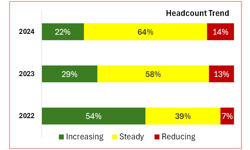At a time when publishers debate the future existence of the printed word, the Spectator achieves record sale and profitability. When the traditional press is often being written off as yesterday’s media, and political magazines remembered as elitist, long-dead remnants of Empire, it comes as a very pleasant surprise to find the Spectator magazine not only alive but in rude health. Publishing to a very specialist marketplace, offering political and literary comment, the Spectator celebrates its 177th birthday this year and a decade of growth. Over these last ten years, circulation has grown by 22% from 55,000 to an almost bulk-free 67,000, average paginations from 56 to 84, cover price by 48% and advertising revenue expanded to a level where the magazine is now substantially profitable, in contrast to its condition in the early 1990s. In this internet age, all this seems to go against the general trend. How was it achieved, and what are the lessons for publishers?
Strictly no bicycles
The Spectator is certainly different. As one stumbles into ‘reception’ - the modestly proportioned, comfortably scruffy hall of a smallish terraced house off London’s Grays Inn Road, one’s first encounter is with a bicycle, sprawled under a sign strongly prohibiting the parking of bicycles. Could this, one wonders, be the famous transport of Boris Johnson, the iconic editor of the Spectator? Proof soon shambles amiably down the stairs under a fierce sprouting of blonde hair, the instantly recognisable occasional chair of ‘Have I Got News for You’, MP for Henley-upon-Thames, and controversial ex-Culture Shadow in Parliament. The cycle is retrieved, pointed in the direction of the front door, and Boris is on the move again, apparently mumbling to himself. Clearly investment in the Spectator has been deployed in directions other than glass and chrome receptions (there are no chairs for visitors – there are stairs to sit on) or on chauffeur-driven cars for its famous editor.
Two lessons are provided by this first impression. Firstly, says Alex van Straubenzee, the Spectator’s circulation manager, ‘Brand Boris’ is very important to the Spectator and particularly in attracting new readers and buyers to trial. Winning new readers is a key part of the circulation strategy, as up to 3,000 retail buyers annually will subsequently convert to subscription (subscribed copies are some 60% of total circulation). Good PR and word-of-mouth, backed up by strong stories, is therefore very important in winning new triallists and securing good retail presentation. Secondly, investment has been directed in a sustained way to achieving long-term goals. Says Alex, "It has been strong editorial that has fuelled circulation growth, allowed increased paginations, attracted more advertising, and allowed more investment. But it has also been the willingness of past and present owners to invest in carefully argued strategies that have avoided the tactical and reinforced the relationship of the magazine with its constituency." In a world where many publishers are interested only in a short term ‘hit’, such a long term view is unusual and clearly effective.
Relationship building
A care for the long-term relationship with both buyers and prospects is evident. Says Don Brown of Solo Digital, the Spectator’s subscription guru, "We aim to create a feeling that readers are part of a club. We therefore run about 10 promotions each year which, as well as being profitable, reinforce this atmosphere. We hold dinners and wine tastings for example. A particularly successful recent event was a champagne tasting at Viscount Linley’s furniture showroom."
This interest in creating a personal relationship extends to those who do not read or buy. Says Don "While we will sometimes market subscription tactically, we see subscription solicitation more as a long term exercise in relationship development." Subscribers are recruited from loose inserts contained within the book. "But" says Don, "much of our new subscription is still recruited through direct mail. We are very careful in our list building, ensuring that the people we mail will be likely to be interested in what we have to say. Over the years we have spent more time in list building, have mailed fewer people but achieved higher responses. We are very careful not to over-mail and will approach people never more than three times a year with a carefully targeted proposition."
Continues Don, "Our interest is not in making dramatic cut-price or heavily incentivised offers that attract a sudden but short-lived spike, because we have found that retention of such orders is poor." Don describes how some publishers are undermining their brands with short term, highly discounted and repeatedly mailed promotions seeking "10,000 new subscribers by next Tuesday." "People aren’t stupid", says Don, and will soon learn to "hang on for the next (cheap) offer." Don therefore seeks to avoid encouraging people to become price sensitive and promiscuous offer junkies. "Our aim is to develop a sustained awareness and interest in the title, and to build long term loyalty. Over 80% of subscribed orders are renewed and this retention rate is fundamental to growing our sale."
Other sources
Subscribers, however, are signing up through other media. A small but growing proportion now subscribes over the internet, currently some 1,000 new subscribers annually and more renew through the medium. Don is also using outbound telephone to win new subscription. "We do not telephone cold lists", says Don "but will telephone people with an existing affinity, such as web registrants, lapsed subscribers, recipients of free copies or names gathered from ‘reader-get-reader’ programmes." The Spectator is also a member of the 12-strong ‘Cultural Publishers Group’ which includes titles like The Week, New Statesman, Guardian Weekly and New Internationalist. This group jointly promotes subscription through inserts and the web.
The strength of the title has allowed the elimination of all tactical bulk sales, the only remaining being distributed to the first and business class cabins of airlines, such as British Airways, Eastern Airways (where the Spectator is the only non-house magazine offered) and Virgin Atlantic. Such a strategy again provides an opportunity for trial, and to build readers up the ‘loyalty ladder’ ultimately as direct-debit subscribers involved in loyalty activity. Don accepts that not all triallists will end up as loyal subscribers - "some readers will never subscribe" - but maintains that his long term goal is loyalty on the reader’s terms.
A team game
It is quickly clear that, at the Spectator, it is a team game and that there is unity of purpose across the magazine. Says Alex van Straubenzee "We have only succeeded because we are a team – but I won’t pretend that we are without built-in tensions." Alex contrasts his role, which is to build circulation at retail, with that of Don Brown, which is to build subscription. "It could be seen that we are competing for buyers and tempted to work against each other," says Alex, "but in fact we work well together. Retail sales are important in winning trial and casual purchase, and act as a feeder to subscription, thereby bringing readers up the loyalty ladder. But the more successful we are, the more pressure on me to bring on new retail buyers." Whatever the pressures, retail sales are up by 800 copies over the last 12 months, and subscribers have now reached 40,000, some 60% up on the figure of 25,000 ten years ago.
Tough retail environment
And the retail marketplace is a dynamic and difficult one, changing under a variety of influences, not just through OFT judgements on competition or the growing power of the supermarkets. But Alex van Straubenzee is quick to praise his cohorts at the Telegraph newspapers, a company also owned by the Barclay brothers. "My colleagues at the Telegraph distribute the Spectator and give me enthusiastic support and a presence in the marketplace with wholesalers and retailers that I would not have if I was just one of a stable." Don also faces challenges, notably from the sharply increased postal costs implied by the Royal Mail’s new pricing regime (‘pricing in proportion’).
By any standards, the Spectator is a success story. Evidently the increased visibility that its editor Boris Johnson (and publisher, Kimberly Quinn) have brought the title has helped to build awareness. But clearly the personalities and abilities of Alex van Straubenzee and Don Brown have also been key. Both are well established. Alex has been in his role for nine years, following a career in the wholesale sector, and Don some 14 years, thus reinforcing the long-term focus of the business. The impression one receives of Alex is of a clear-thinking, committed, experienced and focused person with the excellent social skills needed to win over the many people involved in the retail chain. Don comes across primarily as someone who cares deeply about the task of winning new subscription, as a shrewd and pragmatic analyst with unparalleled experience of the subscription process and of building long term relationships with readers. They complement each other well. And they are ambitious, admitting to a target of an 80,000 copy sale in the medium term.
So what is the overwhelming lesson offered by the Spectator? It is in its rebuttal of the defeatist cash-cow strategies of some other publishers who seem convinced that the printed word has had its day and that the only route is to wring as much profit out of such businesses before abandoning them. Of all titles, the Spectator would seem to be the ultimate candidate for cash-cow thinking with its emphasis on reading and on radical but right wing political comment, perhaps more reminiscent of an era of gentleman’s clubs and country houses. In today’s time-poor world we are told that reading is going out of fashion, yet the Spectator has never had such a sale or been so profitable. Surely there are lessons for us as we consider the future of the printed word?
FEATURE
The Spectator – 177 years young
In the circulation building game, a high profile and instantly recognisable editor is probably the trump card. Not many titles have one. One that does is the Spectator, a title first published in 1828 and currently enjoying healthy circulation growth. Besides Boris, what are the reasons? Tony Coad finds out.










